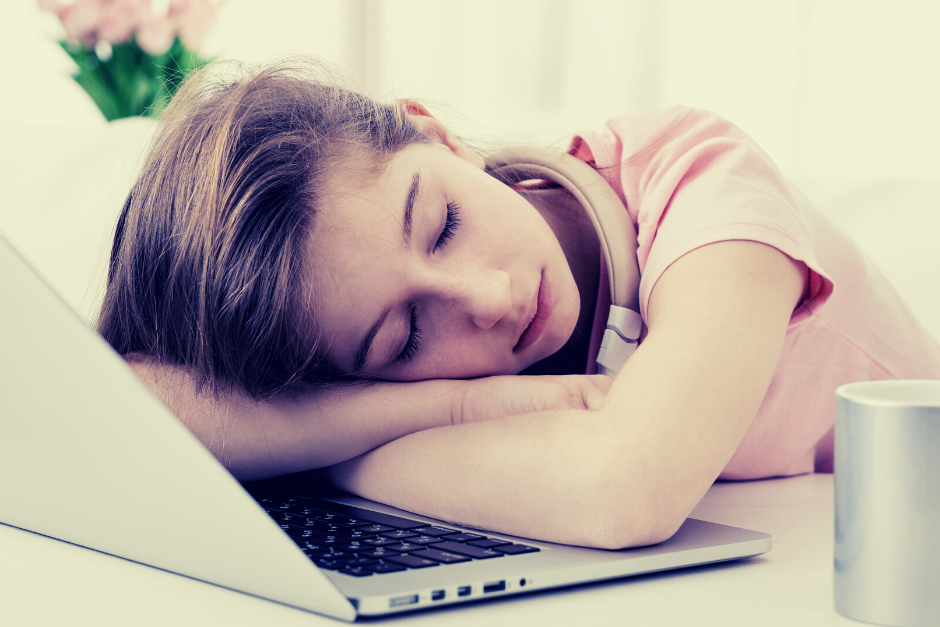I often hear parents complain about their children’s strange sleep habits. During the school year, they’re gone all day, up late into the night and zombies in the mornings. During the summers, it’s even worst – without a set schedule, teens often stay up until the early morning hours and sleep into the afternoon.
To an extent, young people’s odd sleep patterns are natural. Among the hormonal changes adolescents and teens go through is a shift in the body’s production of melatonin (or the sleep hormone). A teenager’s natural circadian rhythm would be to go to bed after midnight and sleep until 10 or 11 a.m. So even in the best of circumstances, it’s hard for young people to get the sleep they need (eight to 10 hours) when school starts at 7:30 a.m.
Now, add after-school activities, homework and school stress. Then, consider the amount of time most young people spend on their devices, and it’s not surprising that so many are so tired. According to the Sleep Foundation, the number of teens sleeping less than eight hours rose by 24% between 2006 and 2013 (around the same time that smartphones became ubiquitous). Social media, games and videos can make hours fly by, while the blue light coming off electronic devices sends a signal to the brain to further suppress the production of melatonin so kids don’t feel tired.
But good quality sleep is critical for physical health, emotional and mental development, and school performance. When young people don’t get enough sleep they are in a kind of haze that can negatively affect their moods and their ability to think, react, regulate their emotions or learn. According to the Child Mind Institute, half the teens one expert evaluated were so tired in the morning that they showed the same symptoms as patients with narcolepsy, a sleep disorder in which the patient nods off and falls directly into REM sleep.
The Effects of Sleep Deprivation
Prolonged lack of sleep can negatively affect:
- Mental health – Even being sleep-deprived for one day can affect your mood, causing irritability and exaggerated emotional reactions. Prolonged sleep loss can lead to serious mental health issues. Anxiety, depression, bipolar disorder and suicidal ideation are routinely linked to poor sleep in the research.
- Physical wellness – Getting enough sleep can have an impact on an adolescent’s metabolic profile that may put them at higher risk of diabetes and long-term cardiovascular problems. At the same time, increased injuries and accidents are linked to lack of sleep. One example is data showing that an estimated 100,000 car accidents each year are caused by over-tired or drowsy drivers, more than half of these are under the age of 25.
- Self-regulation – Lack of sleep has been linked to aggression, impulsiveness and being short-tempered. It can produce some of the same symptoms as attention deficit hyperactivity disorder (ADHD), including an inability to sit still, stay on task or focus at school.
- Decision-making and safety – According to research in the Journal of Youth and Adolescence, sleep deprivation affects the development of the frontal lobe, a part of the brain that controls impulsive behavior. Young people who don’t get enough sleep are more likely to engage in high-risk behaviors like drunk driving, texting while driving, riding a bicycle without a helmet, and failing to use a seatbelt. Drug and alcohol use, smoking, risky sexual behavior, fighting, and carrying a weapon have also been identified as more likely in teens who get too little sleep, according to Youth Risk Behavior Survey data.
Healthy Sleep Tips
Parents can set expectations and support healthy sleep habits by:
- Setting ground rules about bedtime and screen use.
- Supporting a balanced school/activities/homework schedule. Help your child have realistic expectations about how much they want to achieve in a day. They should not feel pressured to over-schedule or spend hours doing homework every night.
- Ensuring a calm atmosphere in the home at bedtime.
With some small changes in lifestyle young people can adjust their body clock over time to get more sleep. Here are the Sleep Foundation’s recommendations:
- Budget eight hours of sleep into your daily schedule both weekdays and weekends.
- Create a consistent pre-bed routine to help with relaxation and falling asleep fast.
- Avoid caffeine and energy drinks, especially in the afternoon and evening.
- Avoid snacking at bedtime.
- Put away electronic devices for at least a half-hour before bed and keep them on silent mode to avoid checking them during the night.
- Set up your bed with a supportive mattress and comfortable pillow. Try to use bed only for sleeping.
- Keep your bedroom cool, dark, and quiet.
- On weekends, no matter how late you go to bed, try to get up within 2 hours to 4 hours of your usual wake time. This is especially important if you have trouble falling asleep on Sunday nights.
Summer can throw even the healthiest sleep habits out of whack. The shift back to a normal pattern will require time and patience, experts suggest moving up bedtime and wake time by about 30 minutes, every few days, to gradually adjust to an early start again.
Getting enough sleep is important for young people to be their best selves emotionally, physically and at school. So protecting and supporting healthy sleep routines is key. If your adolescent or teen always seems sleep-deprived, consider having them evaluated by their physician.

